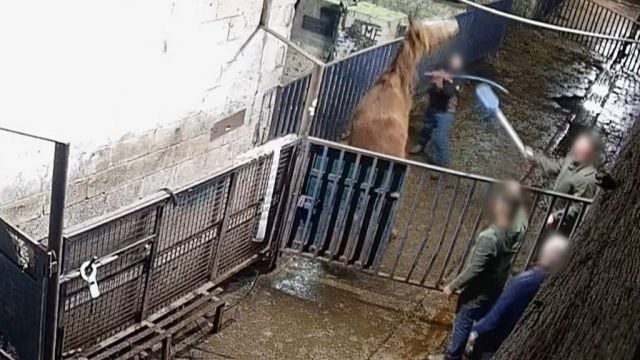The governing body of Irish horse racing has said it was “deeply shocked and appalled” by the content of an RTÉ Investigates programme about the supply of horses for slaughter.
A documentary broadcast on Wednesday night revealed serious animal welfare abuses and cruelty in the treatment of horses that are being sent for slaughter at the country’s only licensed equine abattoir.
The behaviour was filmed in a building (a lairage) used by Shannonside Foods Ltd in Straffan, where the company keeps horses before they are brought to the kill room. Footage captured by RTÉ showed the routine mistreatment of the animals.
RTÉ also analysed data which allowed them to track back and identify thousands of horses that passed through Ireland's only licensed horse abattoir.
Two-thirds of the horses were thoroughbred racers, competitors who between them had raced more than 3,000 times, earning their owners more than €1.5 million on tracks across Ireland, the UK and France as well multiples of that for punters.
The racing industry will receive €76 million in State support this year.
However, John Osborne, the director of equine welfare at Horse Racing Ireland, questioned the figures on horse mortality rates revealed in the investigation.
“Those figures do not stack up”, Mr Osborne told RTÉ radio’s Morning Ireland. “They make no sense whatsoever.”
Mr Osborne, who is a vet, said that he had never heard or seen anything like the details revealed. “It was abhorrent and disgusting and, not in any way reflective of my lived experience around the horses all those years.”
He said traceability had been a top priority for Horse Racing Ireland for years and huge advances had been made.
“The identity systems we've developed over the years include five forms of verification. We have the provenance through the pedigree. We have the markings, which are the equivalent of human fingerprints. We take DNA analysis, we implant a microchip, and now we have a digital version of the paper based passport, which brings with it great functionality, which will improve the situation.”
Mr Osborne said there were “expected mortality rates” for horses. “So we know the number of animals that are likely to die in any given year in a known population of over 100,000 horses on the island, 40,000 of whom are thoroughbreds. So, like, we have only two options in this situation. One is euthanasia and disposal.
“Those figures [in the RTÉ investigation] do not stack up. They make no sense whatsoever.
“Our attitude to all this subject is we welcome critical friends. We welcome challenge. We welcome people who ask us to do better.”
Footage captured by RTÉ's hidden cameras also shows the routine abuse of animals. The abuses included ill-treatment of dying horses. Viewers can see horses routinely be whipped and struck with long lengths of plastic piping, including being hit around the head.
In another example, a horse is filmed struggling for hours before it fell, and tried to get up many times. The only attention the horse got was the illegal use of a pitchfork in its side to try and force it up. After hours of struggling, it died. It was physically dragged out of the shed the next day.
Professor Christopher Elliot, founder of Queen's University Belfast’s Institute for Global Food Security: "I've visited lairages and slaughterhouses for probably about 45 years. I have never seen anything like this. This is ... like nothing I have seen ever experienced before, it's just is unbelievably distressing."
Forensic veterinary expert David Martin reviewed the material and said it raised serious concerns regarding the welfare of horses. "There's no reason why the horses should be subjected to the cruelty that they're being subjected to. There's absolutely no justification for it."
In a statement issued following the documentary airing, Minister for Agriculture Charlie McConalogue said he was “taking this matter extremely seriously”.
“My department has already commenced an investigation in recent weeks involving the supply of equines for slaughter, with aspects of the ongoing investigation related to some of the broadcast activities,” he said.
Any new allegations or evidence of malpractice or allegations of illegal activity in the equine industry that the programme has brought to light “will be thoroughly investigated by my Department”, he added.
Horse Racing Ireland said its board, management and staff were “deeply shocked and appalled” by the content of the RTÉ Investigates programme.
In a statement, it said the “behaviour depicted in the RTÉ documentary is disgusting and is not the experience of the vast majority of the 30,000 people who make their livelihood in the horse racing and breeding industry in Ireland”.
Criminal and regulatory sanction “must be imposed on anyone found to have behaved in an illegal way towards horses,” it said.
Shannonside Foods Ltd said any allegation of an equine being mistreated "will be fully investigated by the Company".







